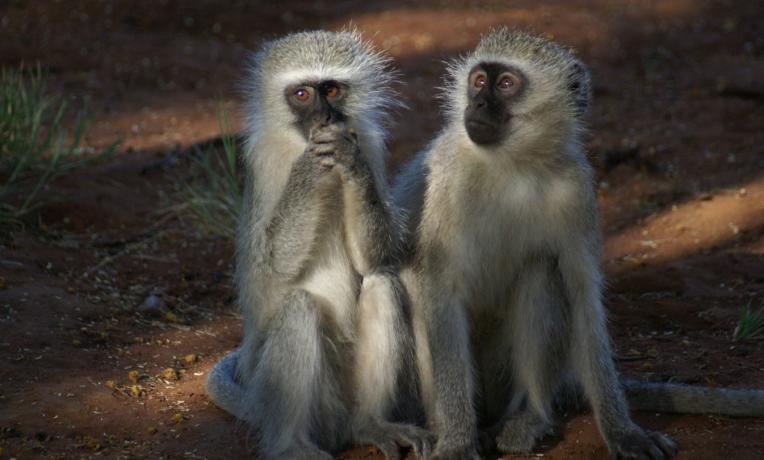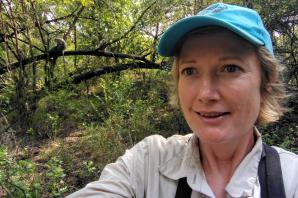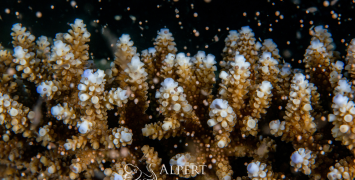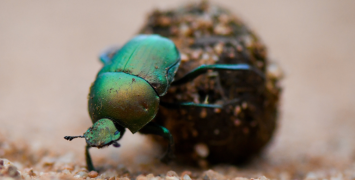A monkey’s perspective on culture

By Lisa Motzig
Biologists typically define culture as the common behaviours shared by members of a group, learned from each other through social interactions rather than being inherited genetically or shaped by the environment. In other words, cultural behaviours are learned by observing and interacting with others in the group.
As Van de Waal summarises, studying cultures amounts to exploring ‘how we do things here, in terms of foraging, food preference, or dialects' While it is common knowledge that the French prefer sweet breakfasts and the Japanese typically avoid physical contact, the customs, and cultures of primate groups are less apparent.
Although vervet monkeys are not apes like chimpanzees or humans, some of their features make them particularly suitable for studying social learning and the origins of human culture. Vervet monkeys are opportunistic and enjoy trying new things, such as different types of food. Their groups consist of about 30 members, with males migrating several times in their lifetime and females remaining in their group of origin. These traits make it possible to run experiments that compare how vervet monkeys learn and adapt to new situations, track how information spreads, and see how immigrant males fit into new groups or how much residents learn from immigrants.
A day in the field
Founded by Erica van de Waal and colleagues in 2010, the field site of the INKAWU Vervet project spans a unique 10,000-hectare private game reserve. Home to seven groups of vervet monkeys with overlapping territories, this site offers a valuable opportunity to study cultural behaviours. Since these groups share the same genes and environment, any behavioural differences observed are likely cultural.
As part of her ERC-funded project, Erica van de Waal equipped several monkeys with small devices (such as audio recording collars) to collect extensive data over several years. While these devices help gather data from free-ranging animals, the researchers are far from idle. In winter, they start their days at 6:30 in the morning, and in summer, they begin around 4:00 to get to the savannah before sunrise. They go to the sleeping site, which is usually found using tracking collars worn by one female in each group. Mornings are the best time for observation because the group is gathered in one place and eager for food. This makes it ideal for conducting experiments, such as introducing of new foods, or puzzle boxes for the group to solve, to see how individuals learn from each other.
At least, that is the theory. As Erica van de Waal relates: 'What is nice about fieldwork is that you never know what will happen. You can plan an experiment, arrive at the sleeping site, and suddenly hear an alarm call for a ground predator, and everyone leaves quickly, leaving you with no monkeys. Or it could be a day when the termites come out of the nest, and the monkeys get crazy, jumping and catching termites all day, leaving no possibility for experiments. Every day is different, and there is always something to make the day special, at least for me, even after all these years.’
New knowledge
Recent findings from the project have revealed fascinating insights. For instance, immigrant males can introduce new behaviours in a group. When an immigrant male shows a habit like opening peanut shells, this can quickly spread throughout the group. While it is known that monkeys often copy high-ranking individuals or that young monkeys mimic their mothers, learning from immigrant males is less expected because they are usually not well integrated into the group.
In essence, immigrant males can either conform to the group’s existing behaviour (like food choices or social behaviours) or introduce new knowledge that benefit the entire group.
Moreover, immigrant males from low-ranking backgrounds generally do better after their initial move. They tend to have better social skills and understand their role, which helps them climb the social ladder in their new group. In contrast, males from dominant lines often act aggressively and try to control resources such as food, making it harder for them to fit in. Van de Waal concludes that ‘for their initial migration having social knowledge is key for immigrant males to integrate into a new group.'
With the ERC grant, the team is studying patterns of co-feeding tolerance, which includes behaviours like sharing food and eating near one another. They discovered that one group’s friendly and tolerant behaviours persisted over ten years, even after a whole new generation replaced the old one. Erica van de Waal is excited about the cultural significance, noting that ‘the group we nicknamed ‘the Love Group’ maintained its reputation for tolerance in both natural and experimental settings over a decade.’
The bigger picture
Studying primates’ culture helps us understand how these animals live and evolved. But Erica van de Waal’s goals go further. Researching vervet monkeys, often seen as a pest in South Africa, highlights their fascinating traits and advocates for their protection.
Studying how cultural behaviours are transferred is important today. While genetic transmission takes generations, behaviours can change quickly, helping species adapt to rapid environmental changes. This research could improve conservation strategies by focusing on protecting diverse behaviours within one species. According to Van de Waal, ‘by simply protecting a species as a whole, you might overlook the diversity of wild behaviours that define it, and risk losing the essence of the species.’
Studying cultures in other primates also helps us compare them with human cultures. Van de Waal says, ‘our unique feature is cumulative culture, where behaviours become more complex over generations.' While other species might have a few traditions, a human population can have hundreds due to our detailed imitation skills, as illustrated in Erica van de Waal’s social learning experiments with children.
There is still much to be discovered about social learning in primates. It is often assumed animals learn on their own, but learning from others is safer and quicker. Erica van de Waal confirms: ‘What we report as cultural behaviour is only the tip of the iceberg. I still have a lot of data to analyse, and I am looking forward to potential new findings on sleeping patterns or dialects in vervet monkeys.’
Biography
Erica van de Waal is assistant Professor at the University of Lausanne, where she leads a research group focused on cultural evolution and cognition. She has spent almost twenty years studying wild vervet monkeys in South Africa. In 2010, she co-founded the INKAWU Vervet Project, an experimental field site with over 250 wild vervet monkeys. Her work is internationally recognised, and she has received several awards and grants, including an ERC Starting Grant for Knowledge Moves, which runs until 2025.






